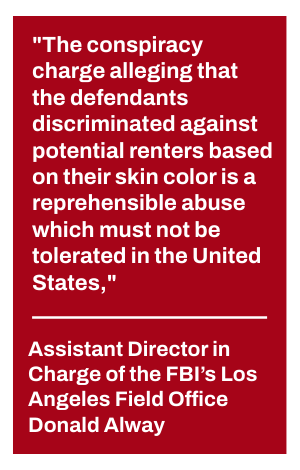FBI makes arrests in national Airbnb scam that targeted properties in Wisconsin
By: Steve Schuster, [email protected]//January 9, 2024//
FBI makes arrests in national Airbnb scam that targeted properties in Wisconsin
By: Steve Schuster, [email protected]//January 9, 2024//
Shray Goel, the man allegedly behind a $8.5 million nationwide Airbnb scam impacting properties in the Badger state, has been arrested, according to court documents obtained by the Wisconsin Law Journal.
Goel is one of two men indicted by a federal grand jury on federal fraud charges that allege a double-booking, bait-and-switch scam run through online property rental platforms, including Airbnb. The misleading listings and fraudulently canceled reservations included discrimination against Black people, Justice Department officials said Thursday.

Goel, 35, who previously lived in Milwaukee and currently resides in Miami, and Shaunik Raheja, 34, of Denver, were charged Wednesday in a superseding indictment that accuses them of fraud in connection with more than 10,000 reservations linked to nearly 100 properties across 10 states.
Goel was initially charged in an indictment returned Dec. 13. He was arrested in Florida on Dec. 27 and was released on bond the following day. Raheja was added as a defendant in the superseding indictment. Both defendants are expected to be arraigned in United States District Court in Los Angeles in the coming weeks, Justice department officials noted.
GOEL owned and operated a short-term property rental business under various names, including Abbot Pacific LLC, marketing properties for short-term rental on Airbnb Inc., according to court documents. HomeAway Inc. was Goel’s company established with Vrbo.
Operations included more than 100 properties across the nation, including in Wisconsin.
According to court documents, Goel also maintained a place of residence in Milwaukee among other locations nationally.

Other locations of Airbnb’s participating in the scam included California, Colorado, Florida, Iowa, Indiana, Ohio, Texas, Tennessee and Illinois.
When guests would leave a negative review about the hosts, Goel would then post negative reviews about the guests.
“If guests complained about a property or posted a negative review, defendant GOEL and others working with him and at his direction sometimes posted and caused to be posted false negative reviews about the guests,” according to court documents.
Federal agents said Goel took advantage of unsuspecting travelers.
“The defendants are charged with preying on unsuspecting travelers and robbing them of time and money, leaving them with no choice but to settle for inferior lodging at the last minute,” said Donald Alway, the assistant director in charge of the FBI’s Los Angeles Field Office.
“The conspiracy charge alleging that the defendants discriminated against potential renters based on their skin color is a reprehensible abuse which must not be tolerated in the United States. The FBI will work with our federal partners and with the private sector to ensure business practices in the vacation rental industry are free of fraud and bias,” Alway added.
According to court documents, Goel would pressure, threaten and insult Airbnb customer service representatives and demand to be transferred
to another representative or a supervisor when representatives indicated they were going to give refunds over defendant GOEL’s objections, which sometimes resulted in representatives denying refunds to which guests were entitled.”
Also according to court documents, Goel double-booked by booking their rental properties twice, and also used bait-and-switch tactics with customers.
In some instances, Goel and associates intentionally “did not update a property’s calendar availability after the property had been booked, and they
continued to advertise the booked property as being available for rental on the already-booked dates,” according to court documents.
Goel and his associates allegedly tricked guests into accepting a replacement booking at an inferior alternative property, and then found ways to refuse to issue a refund to guests.
“Defendant GOEL operated a double-booking, bait-and-switch scheme on the rental platforms, secretly double-booking properties and then inventing fake last-minute excuses for cancelling overbooked guests or tricking them into switching to inferior replacements,” court documents stated.
Goel and his associates allegedly also ran “a secret bidding war to rent properties to the highest bidder by keeping all of their properties in any given area at maximum capacity, and by otherwise being able to choose among overbooked guests, and they often refused to agree to refunds for guests who were entitled to them,” according to court documents.
“In posting listings, defendant GOEL and others working with him and at his direction used false and misleading representations concerning the identities of the hosts, the addresses of the properties, the availability of the properties for rental on listed dates, the reserved status of properties for guests with confirmed bookings, the condition of the properties, and the veracity and completeness of the reviews of the properties and hosts, among other false and misleading representations,” officials said in court documents.
In some instances, Goel and associates allegedly listed properties that did not exist, court documents noted.
In 2015, his group was banned from Vrbo, according to court documents, which noted fake hosts utilized false identities and identification documents.
“Defendant GOEL and others working with him and at his direction used fake host names and in certain instances other people’s identities and identification documents (the “fake hosts” or “fake host accounts”), creating these fake host accounts throughout the course of the scheme and using other fake host accounts they had created dating back to at least 2015. They used the fake host accounts to conceal their own identities, to double-book properties, to hide negative reviews by de-listing and re-listing properties, to protect against properties being removed from the rental platforms (by having properties listed through multiple hosts), and to continue to list properties after they had been banned from Vrbo in 2015 because of repeated host cancellations and guest complaints. … Defendant GOEL and others working with him and at his direction would pretend to be the fake hosts in communications with guests and the rental platforms,” court documents noted.
During an interview with the Wisconsin Law Journal on Monday, an Airbnb spokesperson said, “Airbnb is built on trust, and bad actors have no place in our community. We supported the U.S. Attorney’s Office and the FBI throughout their investigation to help ensure accountability, and we are thankful to them for their work. We have taken multiple steps to strengthen our defenses against deceptive behavior, including measures like identity and listing verification which we believe will help further deter already rare instances of this type of activity.”
According to Airbnb officials, “significant investments” were made to deter bad actors and “crack down on already rare instances of fraudulent behavior.”
Airbnb says they have removed more than 157,000 suspicious listings as a result of the deployment of AI and machine learning. The company also removed an additional 59,000 listings due to suspicion of fraudulent behavior, such as bait and switch.
The hosting site also has the capability of verifying listings. In 2023, Airbnb rolled out identity verification, requiring all booking guests and primary hosts to complete an identity verification process. The platform also provides 24/7 guest support with a 24-hour safety line.
Legal News
- Wisconsin attorney loses law license, ordered to pay $16K fine
- Former Wisconsin police officer charged with 5 bestiality felony counts
- Judge reject’s Trump’s bid for a new trial in $83.3 million E. Jean Carroll defamation case
- Dozens of deaths reveal risks of injecting sedatives into people restrained by police
- The Latest: Supreme Court arguments conclude in Trump immunity case
- Net neutrality restored as FCC votes to regulate internet providers
- Wisconsin Attorney General asks Congress to expand reproductive health services
- Attorney General Kaul releases update at three-year anniversary of clergy and faith leader abuse initiative
- State Bar leaders remain deeply divided over special purpose trust
- Former Wisconsin college chancellor fired over porn career is fighting to keep his faculty post
- Pecker says he pledged to be Trump campaign’s ‘eyes and ears’ during 2016 race
- A conservative quest to limit diversity programs gains momentum in states
WLJ People
- Power 30 Personal Injury Attorneys – Russell Nicolet
- Power 30 Personal Injury Attorneys – Benjamin Nicolet
- Power 30 Personal Injury Attorneys – Dustin T. Woehl
- Power 30 Personal Injury Attorneys – Katherine Metzger
- Power 30 Personal Injury Attorneys – Joseph Ryan
- Power 30 Personal Injury Attorneys – James M. Ryan
- Power 30 Personal Injury Attorneys – Dana Wachs
- Power 30 Personal Injury Attorneys – Mark L. Thomsen
- Power 30 Personal Injury Attorneys – Matthew Lein
- Power 30 Personal Injury Attorneys – Jeffrey A. Pitman
- Power 30 Personal Injury Attorneys – William Pemberton
- Power 30 Personal Injury Attorneys – Howard S. Sicula












